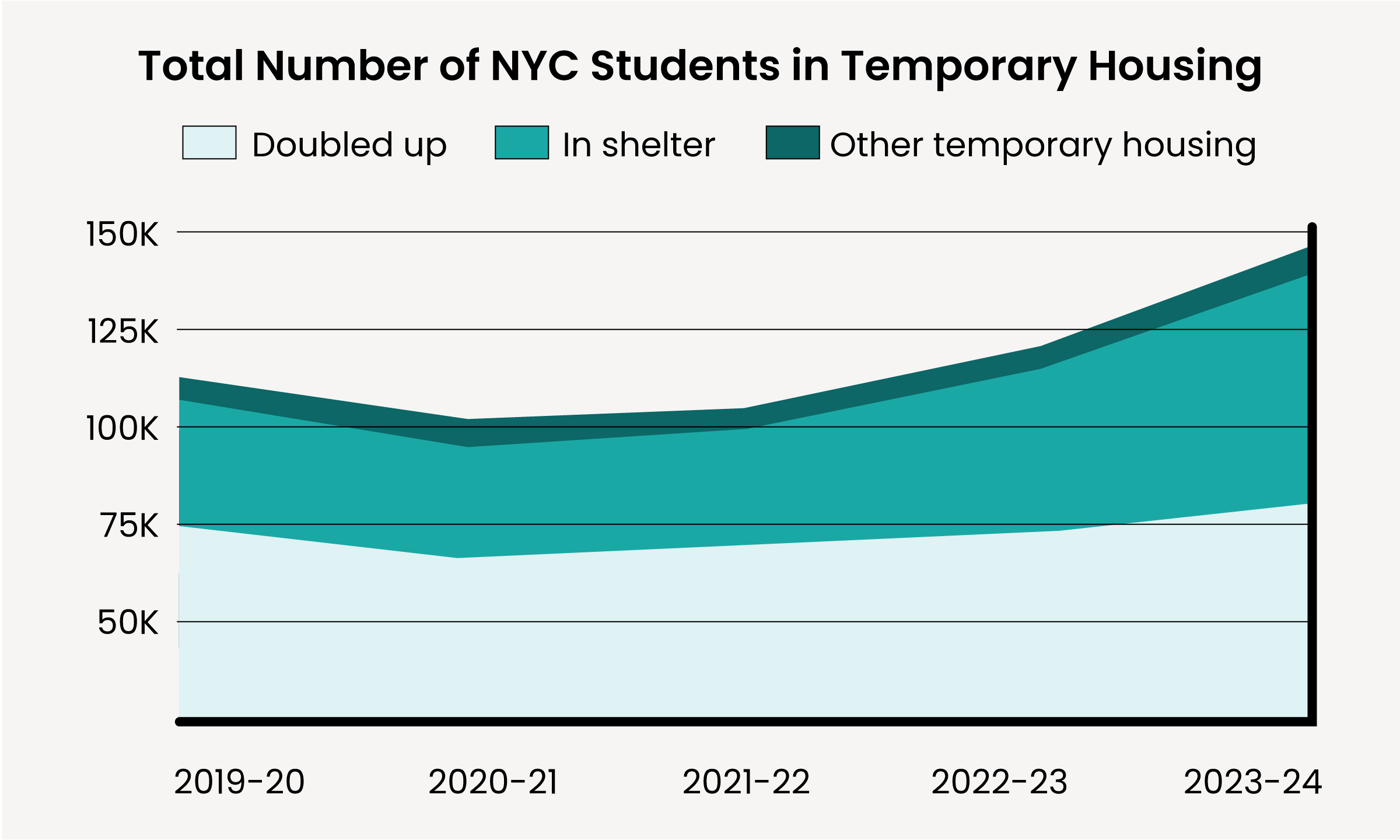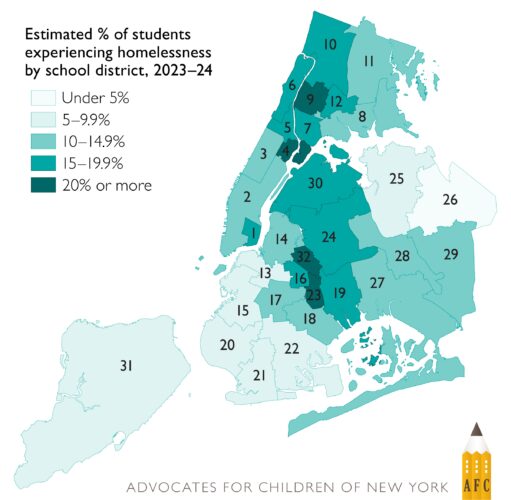With Starkest Increase in a Decade, More NYC Students Without Homes Than Ever
In a 23% increase, the largest seen in a single year, 146,000 students experienced homelessness in 2023-24. What changes experts say are overdue.

Get stories like these delivered straight to your inbox. Sign up for The 74 Newsletter
Across the nation’s largest school system, nearly 150,000 public school students experienced homelessness at some point during the 2023-24 school year – the largest increase in a decade.
New data, released today by nonprofit Advocates for Children of New York revealed around 27,000 more students experienced homelessness than in 2022-23 for a total of 146,000 children. Roughly one in eight children lacked a permanent place to call home.
An influx of asylum seeking students and a rise in domestic violence have likely contributed to the stark increase, experts said, outside of persistent drivers like the city’s lack of affordable housing.
The 23% increase after a decade of mostly under 10% increases has alarmed education and housing advocates who called for the city, state and department of education to address shelter staff shortages, add a weight for the population in the state’s school funding formula, expand access to rental assistance, improve the mass transit system, and prioritize placing students into housing nearest to their school.
According to the latest demographic data of students in temporary housing available from the 2022-23 school year, one in three were English language learners and nearly all were Black or Latino.
This marks the ninth consecutive year student homelessness has exceeded 100,000. The latest tally of students could fill all seats in Yankee Stadium nearly three times over. Each of the city’s 32 school districts saw increases, but students experiencing homelessness were most highly concentrated in the south Bronx, upper Manhattan, and central Brooklyn’s Brownsville and Bushwick, where the city’s largest shelters are.
“The challenges remain stubbornly persistent,” said Jennifer Pringle, director of AFC’s Learners in Temporary Housing Project. “…If we’re [going to] talk about ending family homelessness, we need to make sure that education is front and center. Young adults who don’t have a high school diploma are four to five times more likely to experience homelessness as adults. We have to make sure that our young people right now in shelter are getting the support that they need, so they graduate and flourish beyond high school.”
The numbers, while unsurprising to experts familiar with the growing crisis, are likely still an undercount as to how many children are experiencing homelessness. Data capture only school-aged children, but “the most common age that someone is in shelter is under the age of 5,” said Henry Love, vice president of public policy and strategy with Women in Need, the city and nation’s largest shelter provider.
“We’re probably talking about a quarter of a million or 200,000 children, at least,” Love said, emphasizing families are the main population in shelters today. “I’m still wrapping my mind around it.”
He added that the situation has been exacerbated by Mayor Eric Adams’ vetoing a package of the City Councils’ housing bills, which would have expanded financial assistance to families at risk of homelessness. After the Council attempted to override the vetoes, a judge sided with Adams. The decision is now being appealed in court, leaving thousands of families in limbo.
“The number one thing is if we could keep people in their homes,” he said. “…We have decided by de facto that instead of giving these kids housing that they deserve, we said, you know what, we’ll give you shelter instead.”
Just over half of last year’s students who lived in temporary housing were “doubled-up,” sharing homes with friends or family, and more than 60,000 spent nights in the city’s shelters.

Data obtained from the state’s department of education also revealed alarming education outcomes for students in temporary housing in the 2022-23 school year, the latest available: on state reading and writing tests, proficiency for third through eighth graders was 20 points lower on average; and the high school dropout rate was three times higher than that of their peers.
Students in shelter experienced the most negative educational impacts, seeing rates of chronic absenteeism closer to 70%, in part due to the city’s common practice of initially placing nearly 40% of children into shelters in a different borough from their school, adding strain to already costly and lengthy transportation routes.
About 18% of students in shelters had to move schools at least once during the school year, four times the rate for permanently housed students.
“It’s not good for students, it’s not good for the school to have that level of churn among your student population. You think about the connections that kids have to their peers, their teachers and how vital those relationships are and how much they can help a student during a time of housing instability,” AFC’s Pringle said. “Yet for so many families, they’re forced to contend between these ridiculously long commutes or transferring schools.”
Mayor Adams’ administration also enacted an “inhumane” 60-day stay limit on particular shelters, disproportionately impacting the newcomer immigrant population.
In addition to housing policy reforms, adjusting the state’s per-pupil formula would be critical in boosting kids’ educational outcomes by allowing schools to adequately invest in family outreach, attendance improvement, wrap around services with local community organizations, and academic tutoring.
In a statement, Department of Education spokesperson Chyann Tull said the system has provided “field support, enrollment support, transportation services for students and parents, access to counseling, immunization assistance, and academic support.”
The city has a goal of placing 85% of students in the same borough as their school, but “they haven’t gotten anywhere close to that .. more needs to be done there,” Pringle added. “I think it’s recognized by the fact that they set a goal that they are not achieving – they know that they need to do better.”
Get stories like these delivered straight to your inbox. Sign up for The 74 Newsletter


